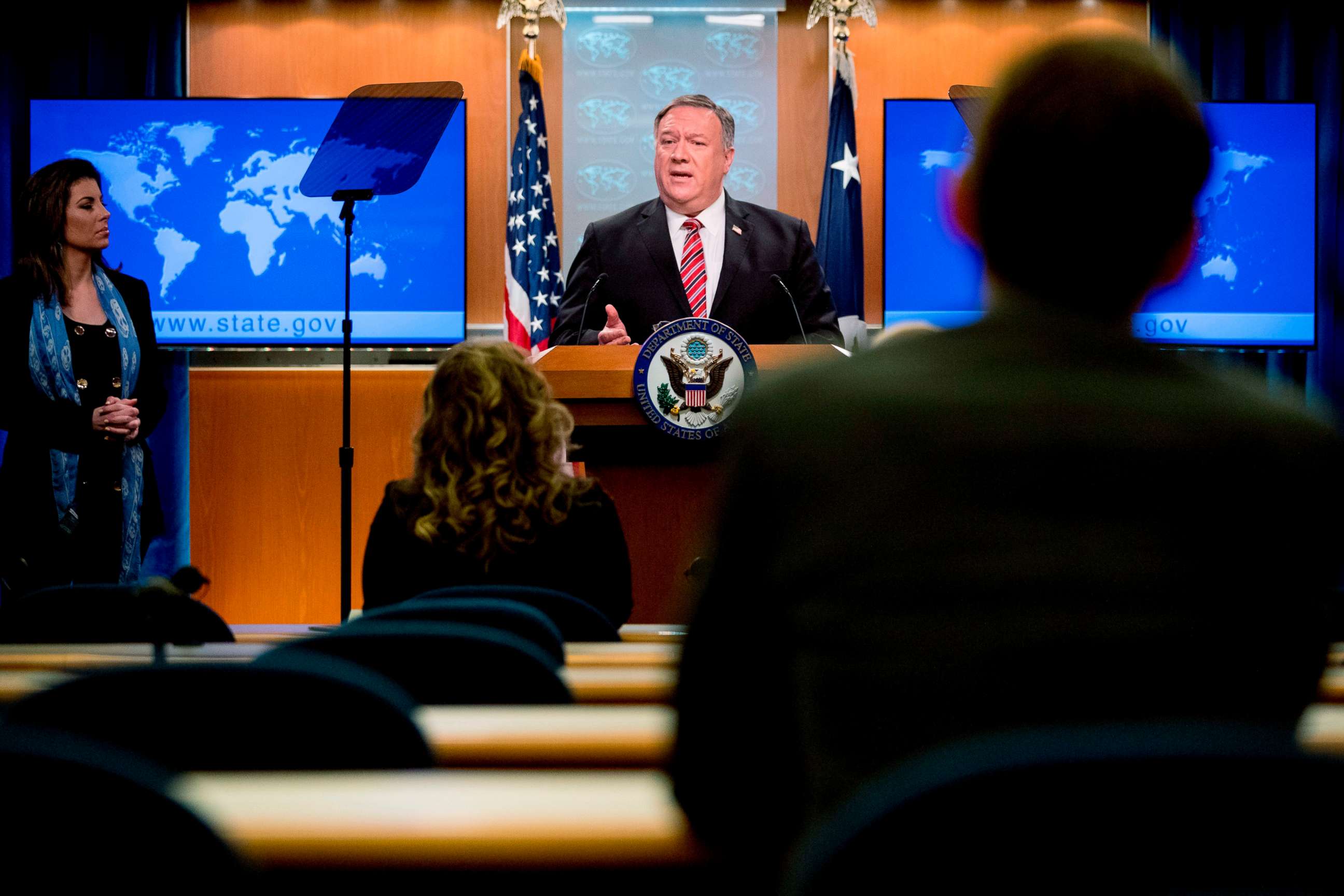Pompeo says no 'certainty,' but 'significant evidence' virus came from Chinese lab
But he provided no details of that evidence, instead lashing out at reporters.
Secretary of State Mike Pompeo doubled down on his assertion that there's "significant evidence" the novel coronavirus first infected a human in a biomedical laboratory in China, even after other senior U.S. officials such as Dr. Anthony Fauci, the nation's top infectious disease expert, have said scientific evidence suggests otherwise.
Pressed on his comment on ABC's "This Week" this past Sunday that the U.S. has "enormous evidence" supporting the lab theory, the top U.S. diplomat lashed out at reporters and said his position was "entirely consistent" with Fauci and others -- instead, a difference in "confidence."
"I'm not sure what it is about that grammar that you can't get. We don't have certainty, and there's significant evidence that this came from the laboratory. Those statements can both be true," he said Wednesday.

Tune into ABC at 1 p.m. ET and ABC News Live at 4 p.m. ET every weekday for special coverage of the novel coronavirus with the full ABC News team, including the latest news, context and analysis.
Dr. Fauci told National Geographic on Monday that the scientific evidence "strongly indicates that [this virus] evolved in nature," dismissing the unproven theory that it first infected a human being in a lab.
The Office of the Director of National Intelligence said in a rare statement last Thursday that the U.S. intelligence community agrees with the "wide scientific consensus that the COVID-19 virus was not manmade or genetically modified," but announced it would investigate whether the outbreak was the result of a lab accident.
Pompeo told ABC News Sunday that he agreed with the ODNI assessment, but went further -- suggesting Chinese scientists accidentally or intentionally caused the first infection at the Wuhan Institute of Virology, an advanced lab in the Chinese city where cases first exploded.
Virologists and medical experts have told ABC News that given the virus is not man-made, a lab accident is also unlikely because it would mean that scientists found the virus occurring naturally in the field, brought it to a lab where samples are inactivated, and then accidentally infected someone.
Pompeo again did not offer details about the evidence, but brushed aside any differences with Fauci or Gen. Mark Milley, the chairman of the Joint Chiefs of Staff who said Tuesday the U.S. doesn't "have conclusive evidence on any of that."
"Your efforts to try and find just -- to spend your whole life trying to drive a little wedge between senior American officials, it's just- it's- it's just, it's just false," he told one reporter, interrupting her question by repeating her name.
Behind those differences is only a different level of certainty, Pompeo argued: "We're all trying to get to clarity. There are different levels of certainty assessed at different places. That's highly appropriate. People stare at data sets and come to different levels of confidence."
He called on the Chinese government to provide that, as neither U.S. scientists nor the World Health Organization have had access to the lab so far.
"There's an easy way to find out the answer to that: Transparency, openness" from Beijing, he said, adding that the U.S. Centers for Disease Control and Prevention had requested access "many times" from its Chinese counterpart, to no avail so far.
Instead, he said, the Chinese government covered up the outbreak in its earliest days by arresting doctors that published details online and destroying viral samples, he said, causing "the deaths of hundreds of thousands of people worldwide."
Without naming Pompeo, China's Ambassador to the U.S. Cui Tiankai denounced American politicians who blame his government for the outbreak, writing in a Washington Post op-ed Wednesday that it "hurt[s] our efforts to fight the disease, our coordination to reignite the global economy, our ability to conquer other challenges and our prospects of a better future."
Pompeo sarcastically called it a "great op-ed," adding, "I can't wait for my daily column in China Daily News," a state-owned newspaper in China.
What to know about coronavirus:
- How it started and how to protect yourself: coronavirus explained
- What to do if you have symptoms: coronavirus symptoms
- Tracking the spread in the US and Worldwide: coronavirus map




